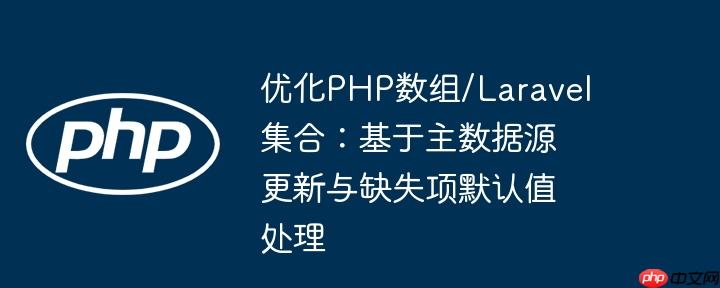
在数据处理中,我们经常面临需要根据一个“主”数据集来更新另一个“从”数据集的场景。这种更新不仅要求合并两者共有部分的数据,还要求能够处理“主”数据集中存在但“从”数据集中缺失的项,并为其设定默认值(例如0)。
考虑以下两个PHP数组结构,它们代表了某个测试的不同分数:
$first = [
"name" => "Test A",
"scores" => [
["name" => "Values", "points" => 9],
["name" => "Algebra", "points" => 6],
["name" => "Science", "points" => 5],
["name" => "Total", "points" => 20]
]
];
$second = [
"name" => "Test A",
"scores" => [
["name" => "Values", "points" => 5],
["name" => "Algebra", "points" => 8],
["name" => "Total", "points" => 13]
]
];我们的目标是根据$first['scores']的结构,更新$first['scores']中的points值。具体要求是:
期望的输出结果如下:
立即学习“PHP免费学习笔记(深入)”;
[
"name" => "Test A",
"scores" => [
["name" => "Values", "points" => 5],
["name" => "Algebra", "points" => 8],
["name" => "Science", "points" => 0], // Science在$second中缺失,设置为0
["name" => "Total", "points" => 13]
]
]对于Laravel集合,开发者可能会首先想到使用diffKeys或diff等方法。然而,这些方法在处理嵌套数组或需要基于特定字段(而非数组索引)进行比较时,往往无法直接满足需求。
例如,如果我们尝试对scores子数组使用diffKeys:
// 假设 $first['scores'] 和 $second['scores'] 已经被转换为 Laravel Collection $collection_first_scores = collect($first['scores']); $collection_second_scores = collect($second['scores']); $collection_new = $collection_first_scores->diffKeys($collection_second_scores); // dd($collection_new->all());
diffKeys方法比较的是集合的顶级键。在我们的示例中,$first['scores']的键是0, 1, 2, 3,而$second['scores']的键是0, 1, 2。因此,diffKeys会返回$first['scores']中键为3(对应"Total")的项,因为这个索引在$second['scores']中不存在。这显然不是我们想要的基于name字段的逻辑,它无法识别"Science"的缺失或"Total"的正确更新。
为了高效且准确地实现上述需求,我们可以利用PHP的引用机制和一次性映射来完成。核心思想是:首先遍历“主”数组,将其所有points值初始化为0,并建立一个name到其对应points变量的引用映射。随后,遍历“从”数组,通过这个引用映射直接更新“主”数组中对应的points值。
以下是实现这一逻辑的PHP代码:
// 原始数据
$first = [
"name" => "Test A",
"scores" => [
["name" => "Values", "points" => 9],
["name" => "Algebra", "points" => 6],
["name" => "Science", "points" => 5],
["name" => "Total", "points" => 20]
]
];
$second = [
"name" => "Test A",
"scores" => [
["name" => "Values", "points" => 5],
["name" => "Algebra", "points" => 8],
["name" => "Total", "points" => 13]
]
];
// 用于存储name到points引用的数组
$refPoints = [];
// 步骤一:遍历$first['scores'],初始化points为0并建立引用映射
foreach ($first['scores'] as ['name' => $name, 'points' => &$points]) {
// 将当前项的points值初始化为0
$points = 0;
// 创建一个以name为键,指向当前points变量的引用
$refPoints[$name] =& $points;
}
// 步骤二:遍历$second['scores'],利用引用更新$first['scores']中的points值
foreach ($second['scores'] as ['name' => $name, 'points' => $value]) {
// 如果$refPoints中存在对应的name,则通过引用更新$first['scores']中的points
if (isset($refPoints[$name])) {
$refPoints[$name] = $value;
}
}
// 输出更新后的$first数组
var_export($first);初始化与引用建立 (foreach ($first['scores'] as ['name' => $name, 'points' => &$points])):
基于从集合更新 (foreach ($second['scores'] as ['name' => $name, 'points' => $value])):
这种方法仅需两次遍历,且通过引用直接修改原数组,避免了不必要的数组复制和查找操作,从而实现了高效的数据同步。
本教程介绍了一种在PHP中高效处理数组或集合数据同步的策略。通过巧妙地利用PHP的引用机制,我们能够以最小的开销实现:
这种方法在需要基于固定结构更新动态数据的场景中非常实用,例如统计报告生成、配置合并或数据清洗等。理解并恰当运用PHP的引用特性,能帮助开发者编写出更高效、更具表现力的代码。
以上就是优化PHP数组/Laravel集合:基于主数据源更新与缺失项默认值处理的详细内容,更多请关注php中文网其它相关文章!

PHP怎么学习?PHP怎么入门?PHP在哪学?PHP怎么学才快?不用担心,这里为大家提供了PHP速学教程(入门到精通),有需要的小伙伴保存下载就能学习啦!

Copyright 2014-2025 https://www.php.cn/ All Rights Reserved | php.cn | 湘ICP备2023035733号